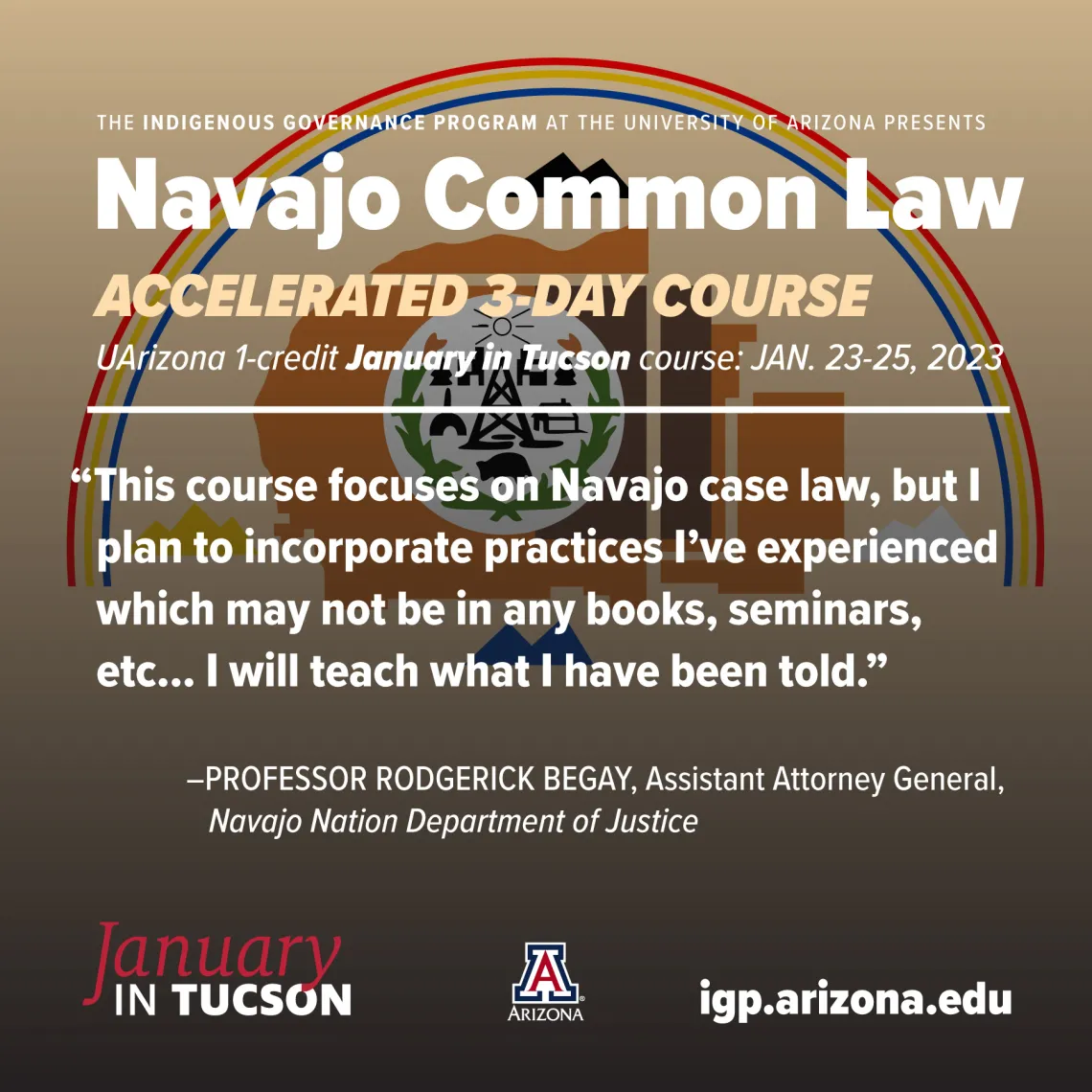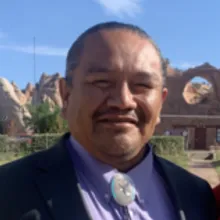Rodgerick Begay on Navajo Common Law

January in Tucson (JIT) is the flagship education event for NNI’s Indigenous Governance Program. Each year, this intensive three-week education session brings together distinguished faculty, Indigenous leaders, Tribal professionals, community members, policy experts, and community members interested in learning actionable ways to empower Native Nations to practice self-governance and engage in nation (re)building in an academic environment designed to encourage crucial dialog and the sharing of ideas.

Professor Rodgerick Begay – Assistant Attorney General for the Navajo Nation Department of Justice – will serve as instructor for the new JIT course on Navajo Common Law on January 23-25, 2023. We sat down with Professor Begay to ask him three questions about his role as instructor of JIT’s new course.
Here’s what he had to say about the course and its place in the pantheon of education about traditional Indigenous law:
Why is your course relevant in Indian Country right now?
Tribal traditions are commonly misconstrued and misunderstood. At least for the Dine (Navajo), we have ourselves to blame.
As a youngster (in the Navajo Nation), you are told about the dos and don’ts. You may not ask why but, when you do, the response could be that “It is not to be talked about.”
If one wanted to learn, there was no writing it down, recording it, or taking pictures. Those were prohibited. You had to live it. In my lifetime, there is a growing acceptance of preserving the traditions. Nowadays, there are courses that can be taken with books, online materials, and audio recordings of traditional practices.
So, when did it become okay to talk about it?
As we evolved, so did our laws. In the 1950’s, civil and criminal adjudications were still managed by the Courts of Indian Offenses. At that time, our choice of law statute came from the federal government that tribal customs could be used in civil cases only, but the custom could not be prohibited by federal law. It wasn’t until 1985 that the Navajo Nation allowed themselves to utilize custom in criminal cases as well. Still, there were not many published court cases incorporating customary law.
In 2002, the Navajo Nation passed the Navajo Fundamental Law statute which also amended our choice of law statute. Navajo Fundamental Law was mandated to be used whenever a Navajo statute was silent on an issue. The growing acceptance of traditional preservation also saw a significant increase in the use of customary practices in our published court cases.
Last year, I was on a panel for the Indigenous Law and Policy Center and Tribal In-House Counsel Association Conference with Professor (Matthew L.M.) Fletcher and Professor (Robert Alan) Hershey (of the University of Arizona James E. Rogers College of Law). The topic was “Traditional Knowledge in the Law,” and it became apparent to me that other tribes are also using traditions in their court systems.
Essentially, for Indian Country, the use of traditions and customs in their legal system has always been relevant. But as tribes continue to use it more often, the time is now to ensure the legacy of our Indigenousness.
The general population tends to have a misconception or misunderstanding about customs and traditions. They see what they see on television and may have no interest in learning about it.
If we don’t take the initiative or we continue to be guarded, then the general population will continue to believe what others illustrate about us in books, TV, etc. As Professor Hershey mentioned, how and who do we educate in terms of non-Indians for tribal court practices of cultural testimony? That is a question for the legal population.
Also, more than ever it seems, the non-Indians are supportive of tribal issues (take, for example, non-Indian involvement in protests against the Dakota Access Pipeline). The more we teach, the more they will learn.
How do you hope to impact your students?
I consider myself a traditionalist, but even I struggled with incorporating customs into case law when I was a staff attorney for the Chinle District Court.
Traditional law is as vast as any set of laws in any law library across the Nation. There’s an unrealistic expectation that one hour at a CLE or a one/two semester course is going to teach you everything. But, as law school teaches any subject like contracts, torts, etc., those individual subjects are also vast. Law school helps to structure these subjects.
When one begins practicing law, that is when one begins to add more to the structure. The same concept applies for tribal traditions. Once I learned the structure, it became easier to understand some of the teachings I was given in my lifetime.
When I attend a seminar or some teaching about Navajo traditions, I am adding to the structure as I have been taught. If it makes it easier for me, hopefully – whether students are traditionalists or not – they will also understand that structure and, if they choose to, they can also begin to add to that structure for themselves.
What makes this course unique from other courses on traditional Indigenous law?
I don’t think there is a CLE, seminar, or other course that will be taught the way I am planning to teach it.
This initial course is a three-day course, so it is very introductory. I hope it is successful because I’m already planning a seven-week course and hopefully it leads to a semester course next Fall. I have a lot of material and I continue to gain material. This could easily become a two-semester course.
This course focuses on Navajo case law, but I plan to incorporate practices I’ve experienced which may not be in any books, seminars, etc. Students get authenticity. I will teach what I have been told and I will not pretend to know what I don’t know.
Also, while it would be helpful to speak Navajo, that is not a requirement for this course. Most times, when one goes to a seminar about tradition, it is entirely or mostly in Navajo. If they want to learn, I will teach them.
January in Tucson takes place January 9-28 at the James E. Rogers College of Law on the University of Arizona campus.

